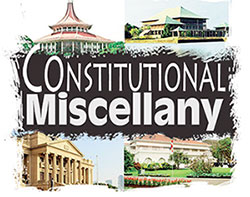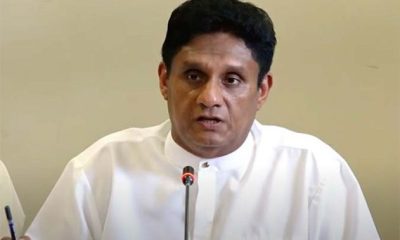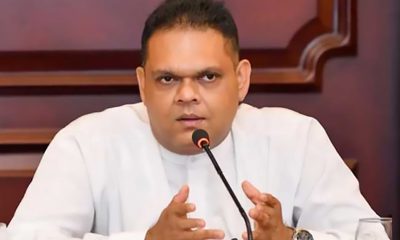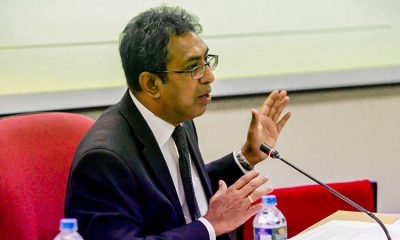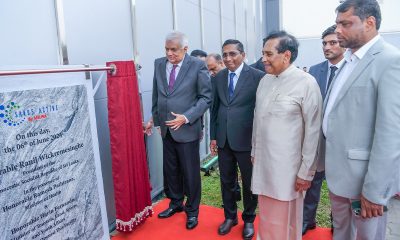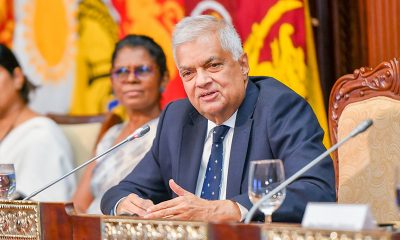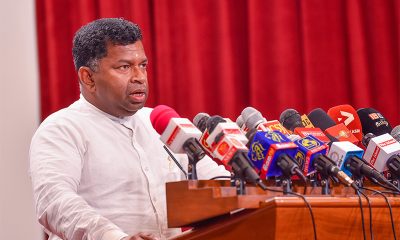Features
On powers of courts to review domestic debt restructuring
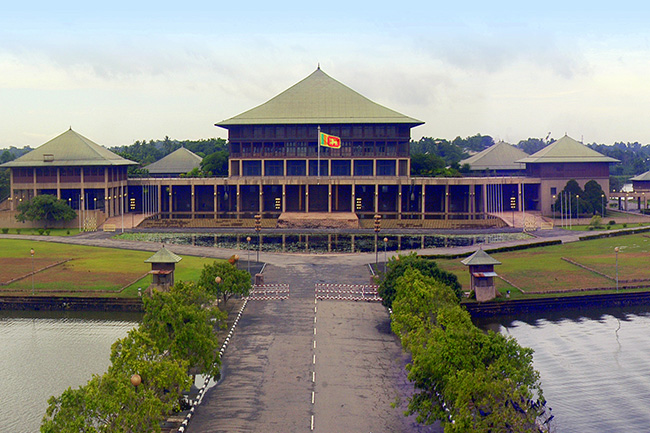
By Dr. Jayampathy Wickramaratne
President Ranil Wickremesinghe’s statement that the government would not heed orders or advice from any other party except Parliament with regard to the debt optimisation measures or domestic debt restructuring (DDR) has been condemned by Opposition parties, civil society groups, and lawyers’ groups as an attempt to undermine the judiciary. Lawyers for Democracy stated that “for one arm of government, which has considerable power in the form of an executive presidency, to make public statements that deny the power of the courts to review any complaint in relation to executive or administrative action is an abuse of power.”
The Cabinet of Ministers decided on the DDR measures on 28 June 2023, clearly a decision of the executive. Legislation would be needed to give effect to some of the measures. Already, a Bill for the amendment of the Inland Revenue Act has been presented to Parliament on 08 August 2023. It proposes changes to the tax rate for employees’ trust funds, provident, pension or gratuity funds and termination funds. Citizens would have the right to challenge the constitutionality of the Bill, including its impact on fundamental rights, within two weeks of its presentation.
On 01 July 2023, Parliament resolved to “grant all requisite approvals to implement this arrangement of domestic public debt optimisation”. The resolution was only an endorsement of the decision without any legal consequences.
The Cabinet decision itself is open to challenge under the fundamental rights jurisdiction of the Supreme Court. Several cases have been filed. Leave to proceed was refused in two cases.
On 09 August 2023, upon a matter of privilege being raised by Minister Harin Fernando, Speaker Mahinda Yapa Abeywardena made an order that no court is empowered to issue orders or judgments of any nature against the resolution passed by Parliament. Any such order or judgment of courts would amount to a violation of item 1 of Part B of the Parliament (Powers & Privileges) Act. Item 1 reads: ‘The wilful failure or refusal to obey any order or resolution of Parliament under this Act, or any order of the President or Speaker or any member which is duly made under this Act.’
It might straightaway be said that a judicial ruling on whether a Cabinet decision is constitutional or not is not a failure or refusal to obey any order or resolution of Parliament. In any event, the resolution passed on 01 July 2023 was only an endorsement of the Cabinet decision and superfluous.
The Speaker relied on Article 148 of the Constitution, which says, “Parliament shall have full control over public finance”, but did not elaborate. How does Parliament exercise such control? The same Article states that “no tax, rate or any other levy shall be imposed by any local authority or any other public authority, except by or under the authority of a law passed by Parliament or of any existing law.” This provision has no application to the instant issue as Parliament has not yet made any law on DDR. By Article 149(1), the funds of the Republic not allocated by law to specific purposes shall form one Consolidated Fund into which shall be paid the produce of all taxes, imposts, rates and duties and all other revenues and receipts of the Republic not allocated to specific purposes.
Article 150 provides that no sum may be withdrawn from the Consolidated Fund except under a warrant issued by the Minister of Finance. No such warrant shall be issued unless the sum has by resolution of Parliament or by any law been granted for specified public services for the financial year during which the withdrawal is to take place or is otherwise lawfully charged on the Consolidated Fund. There are special provisions for the President to authorise expenditure if Parliament has been dissolved before the Budget has been passed and when expenditure is necessary to conduct a Parliamentary general election. Where expenditure has not been provided for in the Budget or any other law, such expenditure is authorised by Parliament by a supplementary estimate. Clearly, the resolution passed on 01 July 2023 does not come with any of the above constitutional provisions.
In any event, a Parliamentary resolution does not have the protection that Article 80(3) offers to a law passed by Parliament, namely that “where a Bill becomes law upon the certificate of the President or the Speaker, as the case may be being endorsed thereon, no court or tribunal shall inquire into, pronounce upon or in any manner call in question, the validity of such Act on any ground whatsoever.” If a Parliamentary resolution cannot be challenged on the ground that it violates the Constitution, citizens would be left without a remedy. What, then, of the supremacy of the Constitution?
For example, Article 68(1) provides that the salaries of Ministers and Members of Parliament be determined by Parliament by law or resolution. If a law is to be passed, citizens could challenge it at the Bill stage. Could a resolution arbitrarily increasing the salaries of Members of Parliament be challenged?
This issue arose in Lanka Railway Trade Union v. Wickramanayake (SC FR 29/2007, SC Minutes 30.01.2007), a fundamental rights application challenging a more than 100% salary increase to Members of Parliament. The case was reported in the Daily Mirror on 31 January 2007 and referred to by Justice Mark Fernando in ‘Defeating the Dragon: Weapons for Fighting Corruption’, a paper he wrote while in retirement. A preliminary objection was taken on behalf of the Attorney-General that ‘although the increase did shock the conscience of everybody, the question was one of law and not of morality’, and the Supreme Court had no jurisdiction to review the resolution passed by Parliament. Leave to proceed was refused, but with the presiding lady Judge dissenting as she was of the view that there was an arguable point.
Justice Fernando pointed out that had Parliament attempted to fix remuneration by law, a Bill for that purpose would have to be published in the Gazette, citizens would have the right to challenge the Bill, and the Supreme Court would have to make a determination with reasons given. The Bill would have to be passed in accordance with the determination, and once passed, the Act could not be challenged. “A resolution fixing remuneration does not have any of those safeguards, and correspondingly does not enjoy the immunity from challenge which an Act of Parliament enjoys.
A resolution under Article 68 is therefore a form of Parliamentary action inferior to legislation, and enjoys no immunity from legislative scrutiny,” Justice Fernando opined. He also emphasised the necessity for the Supreme Court to give reasons for refusing leave to proceed with a fundamental rights application, as “refusing leave is a final decision – an unequivocal decision that there is no merit at all in the petitioner’s case; that he has failed to make out even an arguable case.”
Courts in Sri Lanka have struck down actions of Parliament not amounting to legislation when such actions were violative of the law. The Industrial Disputes Act, as originally enacted, did not prescribe a time limit for a workman to file an application in the Labour Tribunal. The Minister of Labour, purporting to act under the rule-making powers conferred on him by certain sections of the Industrial Disputes Act, made a regulation fixing the time limit at three months of the date of termination of the services of a workman. The regulation was approved by Parliament.
The validity of the regulation was challenged in the 1968 case of Ram Banda v. River Valley Development Board (71 NLR 25). It was submitted on behalf of the respondent that the requirement of approval by Parliament rendered the regulations so approved was tantamount to an Act of Parliament itself, the validity of which is not justiciable by the courts.
It was further submitted that such regulations are law because Parliament says they are law and that they draw their validity not from the law-making power of the authority which made them but from the fact of Parliamentary approval. Justice Weeramantry held that section 39(2) of the Industrial Disputes Act, which provides that every regulation made by the Ministerm should be placed before Parliament for approval and that, on such approval and publication in the Gazette, it shall be “as valid and effectual as though it were herein enacted” did not confer validity on a regulation which is outside the scope of the enabling powers. “The mere passage of such regulation through Parliament does not give it the imprimatur in such a way as to remove it, through the operation of section 39 (2), from the purview of the courts.”
In 1971, Ram Banda v. River Valley Development Board was overruled by the majority of a three-member Bench of the Supreme Court in River Valleys Development Board v. Sheriff (74 NLR 505). The latter decision was, in turn, overruled in 1973 by the then Court of Appeal, which was the highest court of the land at that time after appeals to the Privy Council were abolished, in Ceylon Workers’ Congress v. Superintendent, Beragala Estate (76 NLR 1).
Restoring the decision in Ram Banda, the Court of Appeal held that the provision in section 39(2) that every regulation made by the Minister and approved by Parliament shall be valid and effectual as though it was enacted in the principal Act cannot preclude the courts from examining the validity of such a regulation.
If, as our courts have held, Parliamentary approval of a regulation does not prevent the validity of a regulation from being reviewed, it is not necessary to labour the point that the resolution passed by Parliament on 01 July 2023 merely endorsing the Cabinet decision on DDR cannot prevent the courts from reviewing the validity of the Cabinet decision in a fundamental rights application.
Speaker Abeywardena also relied on a ruling given by former Speaker Anura Bandaranaike in the context of the Supreme Court’s interim order restraining the Speaker from appointing a select committee to inquire into allegations against the then Chief Justice, Sarath N. Silva. Relying heavily on the provisions of the Parliament (Powers and Privileges) Act, Speaker Bandaranaike stated that the Supreme Court had, in several decisions, laid down the principle that it had no jurisdiction to entertain an application under Article 126 if the alleged infringement is not by executive or administrative action.
The issue of whether appointing such a select committee amounted to executive or administrative action was later decided by a five-member Bench of the Supreme Court in Chandraguptha Thenuwara v. Chamal Rajapakse (SC FR 665–7, 672/2012, SCM 24 March 2014) a case on the impeachment of Chief Justice Shirani Bandaranayake. Marsoof J, with Ekanayake, Hettige, Eva Wanasundera, and Marasinghe JJ agreeing, stated that all organs of government, including the courts and other tribunals or institutions administering justice, must always bear in mind Article 4(d) of the Constitution, which expressly provides that “the fundamental rights which are by the Constitution declared and recognized shall be respected, secured and advanced by all the organs of government and shall not be abridged, restricted or denied, save in the manner and to the extent hereinafter provided.
” The learned Judge came to the following finding: “It is the solemn duty of this Court to honour the trust placed on it to respect, secure and advance the fundamental rights enshrined in the Constitution, and in doing so, I have examined very carefully all the provisions of the Constitution and principles of law referred to by learned Counsel in the course of submissions. Having done so, I am inclined to the view that the impugned act of the Speaker of the House of Parliament to appoint a Parliamentary Select Committee was indeed ‘executive or administrative action’ within the meaning of Article 126 of the Constitution.”
Features
The heart-friendly health minister

by Dr Gotabhya Ranasinghe
Senior Consultant Cardiologist
National Hospital Sri Lanka
When we sought a meeting with Hon Dr. Ramesh Pathirana, Minister of Health, he graciously cleared his busy schedule to accommodate us. Renowned for his attentive listening and deep understanding, Minister Pathirana is dedicated to advancing the health sector. His openness and transparency exemplify the qualities of an exemplary politician and minister.
Dr. Palitha Mahipala, the current Health Secretary, demonstrates both commendable enthusiasm and unwavering support. This combination of attributes makes him a highly compatible colleague for the esteemed Minister of Health.
Our discussion centered on a project that has been in the works for the past 30 years, one that no other minister had managed to advance.
Minister Pathirana, however, recognized the project’s significance and its potential to revolutionize care for heart patients.
The project involves the construction of a state-of-the-art facility at the premises of the National Hospital Colombo. The project’s location within the premises of the National Hospital underscores its importance and relevance to the healthcare infrastructure of the nation.
This facility will include a cardiology building and a tertiary care center, equipped with the latest technology to handle and treat all types of heart-related conditions and surgeries.
Securing funding was a major milestone for this initiative. Minister Pathirana successfully obtained approval for a $40 billion loan from the Asian Development Bank. With the funding in place, the foundation stone is scheduled to be laid in September this year, and construction will begin in January 2025.
This project guarantees a consistent and uninterrupted supply of stents and related medications for heart patients. As a result, patients will have timely access to essential medical supplies during their treatment and recovery. By securing these critical resources, the project aims to enhance patient outcomes, minimize treatment delays, and maintain the highest standards of cardiac care.
Upon its fruition, this monumental building will serve as a beacon of hope and healing, symbolizing the unwavering dedication to improving patient outcomes and fostering a healthier society.We anticipate a future marked by significant progress and positive outcomes in Sri Lanka’s cardiovascular treatment landscape within the foreseeable timeframe.
Features
A LOVING TRIBUTE TO JESUIT FR. ALOYSIUS PIERIS ON HIS 90th BIRTHDAY

by Fr. Emmanuel Fernando, OMI
Jesuit Fr. Aloysius Pieris (affectionately called Fr. Aloy) celebrated his 90th birthday on April 9, 2024 and I, as the editor of our Oblate Journal, THE MISSIONARY OBLATE had gone to press by that time. Immediately I decided to publish an article, appreciating the untiring selfless services he continues to offer for inter-Faith dialogue, the renewal of the Catholic Church, his concern for the poor and the suffering Sri Lankan masses and to me, the present writer.
It was in 1988, when I was appointed Director of the Oblate Scholastics at Ampitiya by the then Oblate Provincial Fr. Anselm Silva, that I came to know Fr. Aloy more closely. Knowing well his expertise in matters spiritual, theological, Indological and pastoral, and with the collaborative spirit of my companion-formators, our Oblate Scholastics were sent to Tulana, the Research and Encounter Centre, Kelaniya, of which he is the Founder-Director, for ‘exposure-programmes’ on matters spiritual, biblical, theological and pastoral. Some of these dimensions according to my view and that of my companion-formators, were not available at the National Seminary, Ampitiya.
Ever since that time, our Oblate formators/ accompaniers at the Oblate Scholasticate, Ampitiya , have continued to send our Oblate Scholastics to Tulana Centre for deepening their insights and convictions regarding matters needed to serve the people in today’s context. Fr. Aloy also had tried very enthusiastically with the Oblate team headed by Frs. Oswald Firth and Clement Waidyasekara to begin a Theologate, directed by the Religious Congregations in Sri Lanka, for the contextual formation/ accompaniment of their members. It should very well be a desired goal of the Leaders / Provincials of the Religious Congregations.
Besides being a formator/accompanier at the Oblate Scholasticate, I was entrusted also with the task of editing and publishing our Oblate journal, ‘The Missionary Oblate’. To maintain the quality of the journal I continue to depend on Fr. Aloy for his thought-provoking and stimulating articles on Biblical Spirituality, Biblical Theology and Ecclesiology. I am very grateful to him for his generous assistance. Of late, his writings on renewal of the Church, initiated by Pope St. John XX111 and continued by Pope Francis through the Synodal path, published in our Oblate journal, enable our readers to focus their attention also on the needed renewal in the Catholic Church in Sri Lanka. Fr. Aloy appreciated very much the Synodal path adopted by the Jesuit Pope Francis for the renewal of the Church, rooted very much on prayerful discernment. In my Religious and presbyteral life, Fr.Aloy continues to be my spiritual animator / guide and ongoing formator / acccompanier.
Fr. Aloysius Pieris, BA Hons (Lond), LPh (SHC, India), STL (PFT, Naples), PhD (SLU/VC), ThD (Tilburg), D.Ltt (KU), has been one of the eminent Asian theologians well recognized internationally and one who has lectured and held visiting chairs in many universities both in the West and in the East. Many members of Religious Congregations from Asian countries have benefited from his lectures and guidance in the East Asian Pastoral Institute (EAPI) in Manila, Philippines. He had been a Theologian consulted by the Federation of Asian Bishops’ Conferences for many years. During his professorship at the Gregorian University in Rome, he was called to be a member of a special group of advisers on other religions consulted by Pope Paul VI.
Fr. Aloy is the author of more than 30 books and well over 500 Research Papers. Some of his books and articles have been translated and published in several countries. Among those books, one can find the following: 1) The Genesis of an Asian Theology of Liberation (An Autobiographical Excursus on the Art of Theologising in Asia, 2) An Asian Theology of Liberation, 3) Providential Timeliness of Vatican 11 (a long-overdue halt to a scandalous millennium, 4) Give Vatican 11 a chance, 5) Leadership in the Church, 6) Relishing our faith in working for justice (Themes for study and discussion), 7) A Message meant mainly, not exclusively for Jesuits (Background information necessary for helping Francis renew the Church), 8) Lent in Lanka (Reflections and Resolutions, 9) Love meets wisdom (A Christian Experience of Buddhism, 10) Fire and Water 11) God’s Reign for God’s poor, 12) Our Unhiddden Agenda (How we Jesuits work, pray and form our men). He is also the Editor of two journals, Vagdevi, Journal of Religious Reflection and Dialogue, New Series.
Fr. Aloy has a BA in Pali and Sanskrit from the University of London and a Ph.D in Buddhist Philosophy from the University of Sri Lankan, Vidyodaya Campus. On Nov. 23, 2019, he was awarded the prestigious honorary Doctorate of Literature (D.Litt) by the Chancellor of the University of Kelaniya, the Most Venerable Welamitiyawe Dharmakirthi Sri Kusala Dhamma Thera.
Fr. Aloy continues to be a promoter of Gospel values and virtues. Justice as a constitutive dimension of love and social concern for the downtrodden masses are very much noted in his life and work. He had very much appreciated the commitment of the late Fr. Joseph (Joe) Fernando, the National Director of the Social and Economic Centre (SEDEC) for the poor.
In Sri Lanka, a few religious Congregations – the Good Shepherd Sisters, the Christian Brothers, the Marist Brothers and the Oblates – have invited him to animate their members especially during their Provincial Congresses, Chapters and International Conferences. The mainline Christian Churches also have sought his advice and followed his seminars. I, for one, regret very much, that the Sri Lankan authorities of the Catholic Church –today’s Hierarchy—- have not sought Fr.
Aloy’s expertise for the renewal of the Catholic Church in Sri Lanka and thus have not benefited from the immense store of wisdom and insight that he can offer to our local Church while the Sri Lankan bishops who governed the Catholic church in the immediate aftermath of the Second Vatican Council (Edmund Fernando OMI, Anthony de Saram, Leo Nanayakkara OSB, Frank Marcus Fernando, Paul Perera,) visited him and consulted him on many matters. Among the Tamil Bishops, Bishop Rayappu Joseph was keeping close contact with him and Bishop J. Deogupillai hosted him and his team visiting him after the horrible Black July massacre of Tamils.
Features
A fairy tale, success or debacle

Sri Lanka-Singapore Free Trade Agreement
By Gomi Senadhira
senadhiragomi@gmail.com
“You might tell fairy tales, but the progress of a country cannot be achieved through such narratives. A country cannot be developed by making false promises. The country moved backward because of the electoral promises made by political parties throughout time. We have witnessed that the ultimate result of this is the country becoming bankrupt. Unfortunately, many segments of the population have not come to realize this yet.” – President Ranil Wickremesinghe, 2024 Budget speech
Any Sri Lankan would agree with the above words of President Wickremesinghe on the false promises our politicians and officials make and the fairy tales they narrate which bankrupted this country. So, to understand this, let’s look at one such fairy tale with lots of false promises; Ranil Wickremesinghe’s greatest achievement in the area of international trade and investment promotion during the Yahapalana period, Sri Lanka-Singapore Free Trade Agreement (SLSFTA).
It is appropriate and timely to do it now as Finance Minister Wickremesinghe has just presented to parliament a bill on the National Policy on Economic Transformation which includes the establishment of an Office for International Trade and the Sri Lanka Institute of Economics and International Trade.
Was SLSFTA a “Cleverly negotiated Free Trade Agreement” as stated by the (former) Minister of Development Strategies and International Trade Malik Samarawickrama during the Parliamentary Debate on the SLSFTA in July 2018, or a colossal blunder covered up with lies, false promises, and fairy tales? After SLSFTA was signed there were a number of fairy tales published on this agreement by the Ministry of Development Strategies and International, Institute of Policy Studies, and others.
However, for this article, I would like to limit my comments to the speech by Minister Samarawickrama during the Parliamentary Debate, and the two most important areas in the agreement which were covered up with lies, fairy tales, and false promises, namely: revenue loss for Sri Lanka and Investment from Singapore. On the other important area, “Waste products dumping” I do not want to comment here as I have written extensively on the issue.
1. The revenue loss
During the Parliamentary Debate in July 2018, Minister Samarawickrama stated “…. let me reiterate that this FTA with Singapore has been very cleverly negotiated by us…. The liberalisation programme under this FTA has been carefully designed to have the least impact on domestic industry and revenue collection. We have included all revenue sensitive items in the negative list of items which will not be subject to removal of tariff. Therefore, 97.8% revenue from Customs duty is protected. Our tariff liberalisation will take place over a period of 12-15 years! In fact, the revenue earned through tariffs on goods imported from Singapore last year was Rs. 35 billion.
The revenue loss for over the next 15 years due to the FTA is only Rs. 733 million– which when annualised, on average, is just Rs. 51 million. That is just 0.14% per year! So anyone who claims the Singapore FTA causes revenue loss to the Government cannot do basic arithmetic! Mr. Speaker, in conclusion, I call on my fellow members of this House – don’t mislead the public with baseless criticism that is not grounded in facts. Don’t look at petty politics and use these issues for your own political survival.”
I was surprised to read the minister’s speech because an article published in January 2018 in “The Straits Times“, based on information released by the Singaporean Negotiators stated, “…. With the FTA, tariff savings for Singapore exports are estimated to hit $10 million annually“.
As the annual tariff savings (that is the revenue loss for Sri Lanka) calculated by the Singaporean Negotiators, Singaporean $ 10 million (Sri Lankan rupees 1,200 million in 2018) was way above the rupees’ 733 million revenue loss for 15 years estimated by the Sri Lankan negotiators, it was clear to any observer that one of the parties to the agreement had not done the basic arithmetic!
Six years later, according to a report published by “The Morning” newspaper, speaking at the Committee on Public Finance (COPF) on 7th May 2024, Mr Samarawickrama’s chief trade negotiator K.J. Weerasinghehad had admitted “…. that forecasted revenue loss for the Government of Sri Lanka through the Singapore FTA is Rs. 450 million in 2023 and Rs. 1.3 billion in 2024.”
If these numbers are correct, as tariff liberalisation under the SLSFTA has just started, we will pass Rs 2 billion very soon. Then, the question is how Sri Lanka’s trade negotiators made such a colossal blunder. Didn’t they do their basic arithmetic? If they didn’t know how to do basic arithmetic they should have at least done their basic readings. For example, the headline of the article published in The Straits Times in January 2018 was “Singapore, Sri Lanka sign FTA, annual savings of $10m expected”.
Anyway, as Sri Lanka’s chief negotiator reiterated at the COPF meeting that “…. since 99% of the tariffs in Singapore have zero rates of duty, Sri Lanka has agreed on 80% tariff liberalisation over a period of 15 years while expecting Singapore investments to address the imbalance in trade,” let’s turn towards investment.
Investment from Singapore
In July 2018, speaking during the Parliamentary Debate on the FTA this is what Minister Malik Samarawickrama stated on investment from Singapore, “Already, thanks to this FTA, in just the past two-and-a-half months since the agreement came into effect we have received a proposal from Singapore for investment amounting to $ 14.8 billion in an oil refinery for export of petroleum products. In addition, we have proposals for a steel manufacturing plant for exports ($ 1 billion investment), flour milling plant ($ 50 million), sugar refinery ($ 200 million). This adds up to more than $ 16.05 billion in the pipeline on these projects alone.
And all of these projects will create thousands of more jobs for our people. In principle approval has already been granted by the BOI and the investors are awaiting the release of land the environmental approvals to commence the project.
I request the Opposition and those with vested interests to change their narrow-minded thinking and join us to develop our country. We must always look at what is best for the whole community, not just the few who may oppose. We owe it to our people to courageously take decisions that will change their lives for the better.”
According to the media report I quoted earlier, speaking at the Committee on Public Finance (COPF) Chief Negotiator Weerasinghe has admitted that Sri Lanka was not happy with overall Singapore investments that have come in the past few years in return for the trade liberalisation under the Singapore-Sri Lanka Free Trade Agreement. He has added that between 2021 and 2023 the total investment from Singapore had been around $162 million!
What happened to those projects worth $16 billion negotiated, thanks to the SLSFTA, in just the two-and-a-half months after the agreement came into effect and approved by the BOI? I do not know about the steel manufacturing plant for exports ($ 1 billion investment), flour milling plant ($ 50 million) and sugar refinery ($ 200 million).
However, story of the multibillion-dollar investment in the Petroleum Refinery unfolded in a manner that would qualify it as the best fairy tale with false promises presented by our politicians and the officials, prior to 2019 elections.
Though many Sri Lankans got to know, through the media which repeatedly highlighted a plethora of issues surrounding the project and the questionable credentials of the Singaporean investor, the construction work on the Mirrijiwela Oil Refinery along with the cement factory began on the24th of March 2019 with a bang and Minister Ranil Wickremesinghe and his ministers along with the foreign and local dignitaries laid the foundation stones.
That was few months before the 2019 Presidential elections. Inaugurating the construction work Prime Minister Ranil Wickremesinghe said the projects will create thousands of job opportunities in the area and surrounding districts.
The oil refinery, which was to be built over 200 acres of land, with the capacity to refine 200,000 barrels of crude oil per day, was to generate US$7 billion of exports and create 1,500 direct and 3,000 indirect jobs. The construction of the refinery was to be completed in 44 months. Four years later, in August 2023 the Cabinet of Ministers approved the proposal presented by President Ranil Wickremesinghe to cancel the agreement with the investors of the refinery as the project has not been implemented! Can they explain to the country how much money was wasted to produce that fairy tale?
It is obvious that the President, ministers, and officials had made huge blunders and had deliberately misled the public and the parliament on the revenue loss and potential investment from SLSFTA with fairy tales and false promises.
As the president himself said, a country cannot be developed by making false promises or with fairy tales and these false promises and fairy tales had bankrupted the country. “Unfortunately, many segments of the population have not come to realize this yet”.
(The writer, a specialist and an activist on trade and development issues . )

